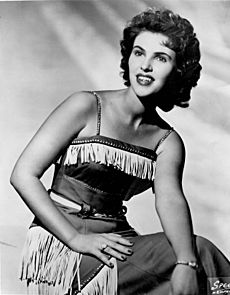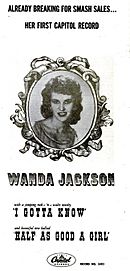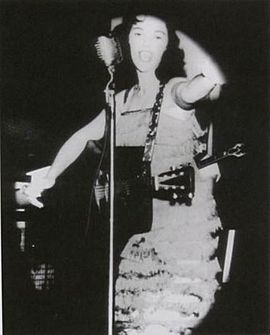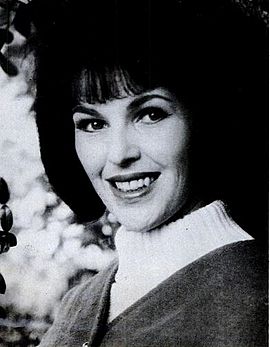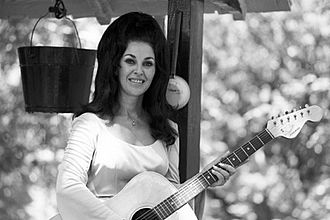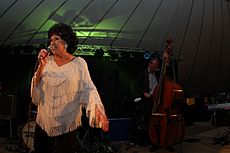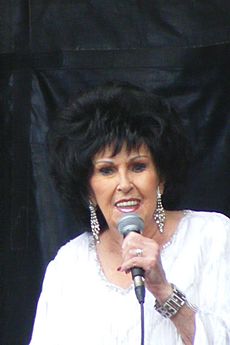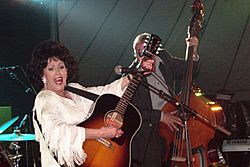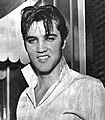Wanda Jackson facts for kids
Quick facts for kids
Wanda Jackson
|
|
|---|---|
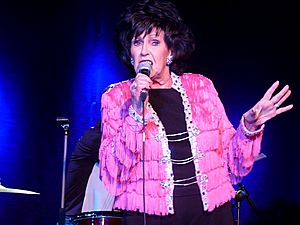
Jackson performing in 2011
|
|
| Born |
Wanda LaVonne Jackson
October 20, 1937 Maud, Oklahoma, U.S.
|
| Occupation |
|
| Years active | 1953–2021 |
| Spouse(s) |
Wendell Goodman
(m. 1961; died 2017) |
| Musical career | |
| Genres | |
| Instruments |
|
| Labels |
|
Wanda LaVonne Jackson (born October 20, 1937) is an American singer and songwriter who is now retired. Since the 1950s, she has made and released music in rock, country, and gospel styles. She was one of the first women to have a career in rock and roll. Her songs from the 1950s earned her the nickname "The Queen of Rockabilly." She is also known as one of the first female stars in country music.
Wanda started performing when she was a child. Later, she had her own radio show in Oklahoma City. Country singer Hank Thompson discovered her and helped her get a record deal with Decca Records in 1954. Her first hit song at Decca was the country tune "You Can't Have My Love." The next year, she began touring with Elvis Presley. They briefly dated, and Elvis encouraged her to try rockabilly music. In 1956, Wanda signed with Capitol Records. This label allowed her to record both country and rockabilly songs. Capitol released many of her rock singles, including "Fujiyama Mama", "Mean Mean Man", and the top 40 hit "Let's Have a Party."
In the 1960s, Wanda returned to country music. She had several popular songs during this time, like "Right or Wrong", "In the Middle of a Heartache", "Tears Will Be the Chaser for Your Wine", and "A Woman Lives for Love." She also recorded songs for the German market overseas. In 1965, her German song "Santo Domingo" became number one on the Austrian pop chart. After becoming a Christian in 1971, Wanda focused more on gospel music. She left Capitol Records in 1973 and signed with Word Records to work more on gospel music. For the next 20 years, she released many gospel albums.
In 1984, European music promoters asked Wanda to tour overseas. That same year, she released her first rock album in 20 years and started a new career in rock music. In the 1990s, American audiences noticed her rock records again. She began touring with fellow rockabilly artist Rosie Flores. During this time, she released popular rock and roll albums like Heart Trouble (2003) and I Remember Elvis (2006). After being added to the Rock and Roll Hall of Fame in 2009, Wanda worked with musician Jack White. They recorded the successful album The Party Ain't Over. For several years, she toured a lot before announcing her retirement from performing in 2019. Her 32nd and final studio album, Encore, came out in 2021.
Contents
Early Life and Music Beginnings
Wanda Jackson was the only child of Tom and Nellie Jackson. She was born in Maud, Oklahoma. Her father worked many jobs, like a gas station attendant and delivery truck driver. He also played music in a local band. Because there were not many chances in Maud, her family moved to Los Angeles, California in 1941. Wanda often sang with her parents at home. In Los Angeles, she learned about western swing music. She loved listening to music by popular western acts like Bob Wills and Rose Maddox. When she was six, her father taught her to play the guitar. She also took guitar lessons and soon became good enough to play with her father.
In the mid-1940s, her family moved to Bakersfield, California. Her father got a job as a barber. Wanda also took piano lessons and kept playing the guitar. During this time, she started having trouble with school. Wanda remembered in her book: "All I wanted to do was sing and play music, and it was impossible for me to sit still." When Wanda was nine, her family moved back to Oklahoma. They lived in Oklahoma City. Her father became a taxi driver, and her mother worked at an air force base.
In Oklahoma City, Wanda sang in the local Baptist church. She also found more chances to perform. Friends encouraged her to try out for the local radio station, KPLR. She was on a show there, and the station's disc jockey was impressed. He told her to try out for another KPLR contest. Wanda won the second contest, which gave her her own 15-minute radio show. On the show, Wanda sang country songs. She remembered not knowing much about how to host a radio show. She said, "I was flying by the seat of my pants, but it didn't scare me to get out on a limb and try something brand new. I liked it."
As a teenager, Wanda went to Capitol Hill High School in Oklahoma City. She continued her radio show. She also dated a fellow student, Leonard Sipes, who later became known as Tommy Collins. In 1952, country singer Hank Thompson heard Wanda on the radio. He invited her to perform with him at the Trianon Ballroom in Oklahoma City. On Thompson's show, Wanda sang "Blue Yodel No. 6" with his band, the Brazos Valley Boys. This led to her regularly singing with Merl Lindsay's country band. Wanda was always performing and sometimes didn't have much time for friends. A high school friend said, "[Wanda] never had time for dates, nothing like that. Just that guitar – that's all she thought about."
Career Highlights
Starting in Country Music (1953–1955)
Wanda kept working with Hank Thompson. In 1953, she appeared regularly on his local TV show. Thompson also made demo recordings of Wanda, hoping major record labels would hear them. Thompson wanted to get his band member Billy Gray a record deal, so he had Wanda and Billy sing duets. Wanda was supposed to sign with Thompson's label, Capitol Records. But producer Ken Nelson turned her down. He told Thompson, "Girls don't sell records!" Wanda remembered hearing this and said, "I recognize that Ken wasn't being sexist, so much as he was thinking about business. But it still gave me a little nudge to prove him wrong!"
Instead, Thompson contacted Paul Cohen of Decca Records. Cohen was interested in signing Wanda and Billy Gray. In 1954, while still in high school, Wanda signed with Decca. In March 1954, the Jackson family went to Hollywood, California. There, Wanda recorded her first songs for Decca with Thompson's band. She recorded several solo songs and a duet with Billy Gray called "You Can't Have My Love." Wanda didn't like the song, but Thompson convinced her to record it. It was soon released as Wanda's first single on Decca. It became a big hit, reaching number eight on the Billboard Hot Country and Western Sides chart. Decca encouraged Wanda and Gray to record a second duet, "If You Don't Somebody Else Will." This song didn't do well because another version by Jimmy & Johnny became popular.
Instead of touring, Wanda started her senior year of high school in fall 1954. She was in the school band and acted in the musical Anything Goes. In March 1955, she went back to the recording studio. This time, she worked with Paul Cohen at the Decca studio in Nashville, Tennessee. Wanda also performed for the first time at the Grand Ole Opry while in Nashville. For this show, her mother made her a dress with spaghetti straps and a sweetheart neckline. The host, Ernest Tubb, told her it was not allowed. So, she covered it with a fringe jacket. She later remembered other Opry members saying bad things about her while she was on stage. She said, "I decided that night that the Grand Ole Opry scene was not for me."
In 1955, Wanda graduated from Capitol Hill High School. She then started touring. Wanda's father quit his job to become her full-time manager. He hired Bob Neal to book her shows. Wanda's first concerts included new performer Elvis Presley. They played many shows together with other country singers in the United States that year. Wanda's father went with her to the shows and drove her from one place to the next. Elvis encouraged her to sing rock and roll music. He played her several R&B records and told her that rock music was becoming very popular. Wanda also joined the TV show Ozark Jubilee in 1955.
Rock and Roll Years (1956–1960)
In 1956, Decca Records ended Wanda Jackson's contract. With Hank Thompson's help, she got a new contract with Capitol Records that same year. At her first Capitol recording session, Wanda recorded two country songs and one rock and roll song. One song, "I Gotta Know", mixed both country and rock styles. Wanda said this song helped her get used to the rock genre. Released as a single in 1956, "I Gotta Know" became Wanda's second successful song. It reached number 15 on the Billboard country and western chart. Wanda continued recording rock and roll music for Capitol. Producer Ken Nelson gave her full permission to do so. Wanda also wrote several of her Capitol songs, including "Baby Loves Him", "Cool Love", and "Mean Mean Man". She also kept recording country music, often putting each style on different sides of a single record.
In 1957, Wanda started working with a new booking agent. This agent set up several tours in 1957 and 1958. Other performers included Johnny Cash, Jerry Lee Lewis, and Carl Perkins. With her new manager, Wanda was earning more money, sometimes up to $500 per show. However, her next songs were not successful in the United States. Wanda said Capitol wasn't sure how to promote her. She recalled in 2017, "Capitol was still trying to figure out what to do with me, but they maintained faith that I could have strong potential in the teen market." To promote her music, the label released Wanda's first album, Wanda Jackson, in 1958. The album had both rock and country songs. It included her covers of rock songs "Money Honey" and "Long Tall Sally." It also had country songs "Heartbreak Ahead" and "Making Believe." Produced by Ken Nelson, it was released by Capitol in July 1958.
"Hard Headed Woman" is one of Wanda's most famous covers. It was originally a hit for Elvis Presley in 1958. She added it to her shows that year. You can hear her singing it on the 2008 album "Live At Town Hall Party 1958." Her way of singing the line "A hard headed woman is a thorn in the side of a man" is very unique. She recorded a studio version in Nashville in October 1960. It appeared in early 1961 on her Capitol album There's a Party Goin' On. Whenever she sang her early rock and roll songs, this one was always part of her show.
Also in 1958, Wanda had success overseas with the rock and roll song "Fujiyama Mama." Ken Nelson didn't want to release the song because it mentioned the Hiroshima and Nagasaki bombings. But the song became very popular with Japanese fans, reaching number one on their music chart. The song's success led Wanda to tour Japan in 1959. She played in big cities like Tokyo and Okinawa. When she returned to America, Wanda played in Las Vegas with Bob Wills. She also did more concerts with her new touring band. At different times, the band included Roy Clark and black pianist Big Al Downing. She remembered touring with Downing. Sometimes, he was not allowed into venues because of his race. Wanda would refuse to play a show unless Downing performed with her. She once told a club owner, "Look, he's part of our band. If he's not welcome, then none of us are."
In 1960, an Iowa disc jockey found Wanda's album cover for "Let's Have a Party." This led to more radio listeners wanting to hear it. Capitol Records encouraged this, and "Let's Have a Party" was released as a single that same year. By July 1960, the song reached number 37 on the Billboard pop music chart. It became her first American rock and roll hit. It was also popular in Australia and the United Kingdom. The success of "Let's Have a Party" made Wanda rename her band "The Party Timers." It also led her label to release the album Rockin' with Wanda (1960). This album included her rock songs recorded in the 1950s. AllMusic later gave it a very good review, with four and a half stars.
Her third studio album for Capitol, There's a Party Goin' On, came out in early 1961. It had more rock and roll songs. Richie Unterberger of AllMusic said the album was a "pretty solid and energetic set."
New Languages and Country Music Return (1961–1971)
In the early 1960s, old rock and roll musicians became less popular as the "Big Beat" of the British Invasion grew. Capitol Records felt pressure, so Ken Nelson met with Wanda to talk about which music style she should focus on. Since her country music had been most successful, they decided to focus on that. Wanda said, "I wanted to record whatever I wanted to record, but I also understood that Capitol Records had made an investment in me." In 1961, Wanda returned with her own song "Right or Wrong." She first planned to offer the song to Brenda Lee. But Nelson thought Wanda could have success with her own version. Wanda agreed and recorded the song. The single reached number nine on the Billboard Hot Country Singles chart. It also made it into the top 30 of the Billboard Hot 100 and number nine on the Billboard adult contemporary chart. An album with the same name followed in 1961. It had country songs on "side A" and rockabilly songs on "side B." Her next single, "In the Middle of a Heartache", was also a hit. It reached number six on the country chart and number 27 on the pop chart.
In August 1962, Wanda Jackson's fourth studio album, Wonderful Wanda, was released. This album included "In the Middle of a Heartache." It also had the popular songs "If I Cried Every Time You Hurt Me" and "A Little Bitty Tear." The latter song was released after Burl Ives's version, which was more successful. Wonderful Wanda received good reviews from critics, including Billboard magazine. They said her singing was "in fine form." Wanda and The Party Timers then toured the southwestern United States. Now married, her husband Wendell Goodman quit his job with IBM to become her full-time manager in 1962. Capitol kept releasing more country songs by Wanda. In 1963, the label released her album of country pop songs called Love Me Forever. In 1964, her sixth studio album, Two Sides of Wanda, came out. This was another album that mixed rockabilly and country songs.
In 1965, Wanda worked with Capitol's German record company, Electrola Records. The label arranged for her to record music in German. They thought her singing voice was "very pleasing to the German ear." That year, she flew to Cologne, Germany. She recorded several songs in German. New songs were written just for Wanda. She was taught how to sing in German by a vocal instructor. After these recordings, Capitol released "Santo Domingo" as a single in Germany in 1965. This song became her first number one hit in her career. It reached the top of the Austrian pop chart and the top five of the German pop list. In Germany and Austria, Wanda had several more popular songs, including the top ten hit "Doch dann kam Johnny." Wanda's success with foreign-language songs led to several European tours in the 1960s. This included shows with Roy Orbison. When she returned to the United States, Wanda also recorded for Capitol Records in Dutch and Japanese.
In the United States, Wanda became more known for country music as the 1960s went on. Between 1965 and 1967, she hosted her own country TV show called Music Village. In 1965, Blues in My Heart became her first album to reach the Billboard country albums chart, peaking at number nine. In 1966, Wanda had her first American hit in several years with "The Box It Came In," which reached the top 20. This was followed by "Tears Will Be the Chaser for Your Wine," which reached number 11. These songs were on her tenth studio album, Reckless Love Affair (1967). This album became her third to appear on the Billboard country albums list, reaching number 17. Wanda had 11 more Billboard country singles in the 1960s. These included top 40 songs like "A Girl Don't Have to Drink to Have Fun", "Both Sides of the Line", "My Baby Walked Right Out on Me", and "Two Separate Bar Stools." Her 1969 song, "My Big Iron Skillet", reached number 20 on the country chart. Her three studio albums, You'll Always Have My Love (1967), Cream of the Crop (1968), and The Many Moods of Wanda Jackson (1968), also made the Billboard country album list.
In 1969, Wanda recorded her first live album in Phoenix, Arizona, called Wanda Jackson in Person. After this album, Capitol Records started using different producers for Wanda instead of Ken Nelson. This included two albums with producer George Richey. Wanda said this ended because of creative differences. Richey and Jackson's recordings led to her next big hit, "A Woman Lives for Love" (1970). This song reached number 17 on the Billboard country songs list. In 1971, Larry Butler was assigned to produce Wanda's next album, I've Gotta Sing. This album was successful, reaching number 19 on the Billboard Country album list. It was her first album to chart since 1968. It also had the song "Fancy Satin Pillows", which became her last top 20 hit on the American country chart.
Gospel Music and Changes (1972–1983)
In the early 1970s, Wanda and her husband became born-again Christians. This change in her life made Wanda want to focus more on Gospel music. She said in her book, "Wendell and I both felt like God was calling us to stop working in nightclubs and bars in order to dedicate ourselves to the ministry." Wanda's husband started removing her concerts from country music nightclubs. These shows made up 80 percent of her income. She also began sharing her faith story on stage and played at various tent show revivals. In 1972, Capitol released her first Gospel album called Praise the Lord. This album featured singing from The Oak Ridge Boys. It also included Wanda's first song that she wrote herself. Billboard magazine liked the album, calling it "a beautiful spiritual album."
To finish her contract with Capitol, Wanda kept releasing country albums. In 1972, the company released I Wouldn't Want You Any Other Way, a collection of ten traditional country songs. It included the top 40 country hits "Back Then" and "I Already Know (What I'm Getting for My Birthday)." In her next recording sessions, Wanda asked Ken Nelson to record another gospel album, but he didn't support it. At the same time, Word Records offered her a contract that would let her record more spiritual music. Knowing she was unhappy, Nelson allowed Wanda to accept Word's offer, and she was released from her Capitol contract. Capitol released her last studio album in 1973 called Country Keepsakes. This album reached number 43 on the Billboard Country album chart.
Wanda's deal with Word also allowed her to record with their label Myrrh Records. In her book, Wanda explained that Word would release her gospel records, while Myrrh would release her country records. In 1973, Word released her second gospel album, Country Gospel. This album had covers of the hymn "Farther Along" and Kris Kristofferson's Christian song "Why Me, Lord." In 1974, Myrrh released the country album When It's Time to Fall in Love Again. The song "Come on Home (To This Lonely Heart)" came from this album. Billboard called the song "a beautiful love song" that showed her Christian "inner spirits." This song was Wanda's last to appear on the Hot Country Singles chart, reaching number 98. Wanda later said that Word lost interest in her country recordings after being bought by Dot Records. She was then only able to record gospel music. Wanda said in her book, "I was stuck, once again, being pigeonholed."
For the rest of the 1970s, Word and Myrrh released three more of Wanda's gospel albums: Now I Have Everything (1975), Make Me Like a Child Again (1976), and Closer to Jesus (1977). Wanda said in her book that none of them were "particularly memorable" to her. In 1979, her contract with the labels ended. Needing a change, the Jackson family temporarily moved to Texas. Wanda became a stay-at-home mother. But the family was not happy with the move. In 1980, they moved back to Oklahoma City. They built a house there, and Wanda continued her music career. That same year, Wanda released a new country album on the UK-based Deep Sea Music company called Good Times. This album had one single, a cover of Melba Montgomery's "Don't Let the Good Times Fool You." In 1982, K-tel released an album of re-recorded songs called Let's Have a Party. With little attention to her music, Wanda felt stuck in her career. She said in her 2017 book, "I wasn't even fifty yet, but I felt like I'd been forced into an early retirement as time had passed me by."
Rock and Roll Comeback (1984–2006)
In the mid-1980s, rockabilly music became popular again in Europe. Wanda's Capitol rock recordings gained interest from European fans. Soon, overseas promoters wanted her to perform. Wanda and her husband saw this as a sign. Her book explained, "Wendell and I both realized that God was going to use our testimony in places that needed it." In 1984, her husband got a call from a Swedish businessman, Harry Holmes, who wanted to record her. Wanda then traveled to Scandinavia to record her first rock album in 20 years. In 1984, Tab Records released Rockabilly Fever. The album was later released in the United States as Rock 'N' Roll Away Your Blues. The album had covers of rockabilly songs like "Stupid Cupid" and "It's Only Make Believe." Allmusic gave the album three stars. Writers Mary Bufwack and Robert Oermann said it had "rockabilly fire."
Wanda often toured Europe during this time. She sang her 1950s rockabilly songs. Many of these songs had not been in her regular shows for years. She remembered having to re-learn the words to songs like "Mean Mean Man" after getting many requests. As the 1980s continued, she found chances to tour in many European countries. These included Spain, Switzerland, Hungary, the Czech Republic, and the United Kingdom. Continued interest in her rock music led to more album releases. One was 1988's Let's Have a Party in Prague. This album was a collaboration with Czech performer Karel Zich and was released on the Supraphon label. She also kept releasing gospel music, like Show Me the Way to Calvary (1981) on the Christian World label and Teach Me to Love (1984) on Vine Records. She also released new country song collections, such as Classy Country on Amethyst Records (1988).
In the 1990s, country artist Rosie Flores told Wanda that rockabilly was becoming popular again in the United States. They met at Wanda's home, where Flores played several rockabilly records and told her about the growing American fan base. They became friends, and Wanda later appeared on Flores's album Rockabilly Filly (1995). After the album came out, they went on a five-week tour across North America. Wanda was surprised to find that her audience was young. She said, "It was kind of eye-opening. Even though the rooms were a little frightening, the audiences couldn't have been sweeter." In the mid-1990s, Wanda also worked with The Alligators for albums released on the Success and Elap labels: Let's Have a Party (1995) and The Queen of Rock' a 'Billy (1997).
In 2001, Wanda played at the Rockabilly Festival in Jackson, Tennessee with The Cadillac Angels. In October 2003, CMH Records released her first American rock album in many decades, called Heart Trouble. She remembered in her book that the project was first meant to be a bluegrass collection. After news spread that Wanda would record an album, several rock musicians contacted the label about joining the project. Musicians who worked on the CD included Rosie Flores, The Cramps, and Elvis Costello. AllMusic's Thom Jurek praised the album in his review. Charlotte Robinson of PopMatters called the album a "triumphant return."
In January 2006, Goldenlane Records released Wanda Jackson's 43rd studio album, I Remember Elvis. The album was dedicated to Elvis Presley. She honored him in the album notes: "Without the encouragement of Elvis, I may have never recorded rock and roll. So this tribute is just my way of saying thank you to a dear friend." The project received a good response from Mark Deming of AllMusic. He wrote, "I Remember Elvis is something short of revelatory, but it is a sincere and loving tribute to an influential artist from someone who learned from him first-hand." Slant Magazine gave the collection three stars. They praised Wanda's singing but noted that the music arrangements were not very different from Elvis's original songs.
Working with Others and Retirement (2007–2021)
Wanda continued to tour a lot in the late 2000s. This included several shows in London, England and a popular show in Santa Barbara, California. She also worked with Jerry Lee Lewis and Linda Gail Lewis for shows at the London Forum during this time. After being added to the Rock and Roll Hall of Fame in 2009, rock musician Jack White asked Wanda to record her next album. They shared song ideas online and met for the first time in 2010 to record the album. Wanda didn't think she would get along with White, who was used to recording "contemporary rock-style music." She eventually trusted him more after getting to know him. Wanda recalled in her book, "It was clear that Jack was for me in every way, and I felt honored by the respect he showed me." White had Wanda record several songs he chose, including Little Richard's "Rip It Up" and Amy Winehouse's "You Know I'm No Good." White also contacted Bob Dylan, who asked her to record his song "Thunder on the Mountain." Wanda agreed and recorded these songs, along with others for the project.
In January 2011, her 42nd album, The Party Ain't Over, was released. This rock album was released on Jack White's record label, Third Man Records. It became Wanda's first album to appear on the Billboard 200 all-genre list, reaching number 58. It also became her first album to make the Billboard Top Rock Albums chart, where it climbed to number 17. The album received a three-star rating from Allmusic's Stephen Thomas Erlewine. He felt that White's influence was too strong. But Erlewine did praise Wanda's singing and found several songs that felt like "they belong to her." Jon Dolan of Rolling Stone gave the album three and a half stars and called the song list "superb." He concluded, "Jackson’s not content to just remake the greats: Her slaying of Amy Winehouse's 'You Know I’m No Good' is a master class for her wild-child inheritors." In her book, Wanda remembered making several TV appearances to promote the album. This included performances on the Late Show with David Letterman and Conan. She also remembered performing on the Grand Ole Opry stage for the first time in decades.
Wanda didn't think she could record an album better than her 2011 release. She was encouraged to go back to the studio and work with singer-songwriter Justin Townes Earle. In her book, Wanda said her voice was "not in top form" when recording the album. She blamed a long concert schedule for her voice quality. In October 2012, Sugar Hill Records released the project called Unfinished Business. It included notes written by Stephen King. The CD reached number 61 on the Billboard Top Country Albums chart in 2012. It was her first album in 39 years to reach a high position there. Mark Deming of AllMusic gave the project a good review. He wrote, "Unfinished Business shows that six decades after her first recordings, that strategy still works, and she can still deliver the goods without a lot of needless fuss." Greg Kot of the Chicago Tribune thought the album was a better fit for Wanda's music roots compared to her previous release. He praised her singing and Earle's production.
In 2017, Wanda's autobiography, Every Night is Saturday Night: A Country Girl's Journey to the Rock and Roll Hall of Fame, was published. Wanda and Scott Bomar wrote it together. It was published by BMG Music and had an introduction by Elvis Costello. Wanda had tried to write a book before but felt the writing "didn't come out well." Working with Bomar made her feel more comfortable. The book launch was celebrated with a party, signing, and performance at the Grammy Museum.
Wanda played a few shows in 2018 before announcing her retirement in March 2019. She told Rolling Stone that a stroke she had was partly why she retired. She also mentioned other "health and safety concerns." In August 2021, Big Machine Records and Blackheart Records released her next studio album, Encore. Joan Jett produced the album. Jett also performs on the record, along with Elle King and Angaleena Presley. Wanda announced that this project would be her last album. Encore featured songs co-written by Nashville songwriters like Will Hoge and Lori McKenna. Mark Deming of AllMusic gave it a good review, with 3.5 stars. He said, "Clocking in at a very 1950s 25 minutes, Encore doesn't feel like a major event and it doesn't add a great deal to the Wanda Jackson story, but it's a welcome reminder that the first truly great female rocker is still among us and hasn't surrendered to time." American Songwriter said that Wanda "sets the standard, and even in her seventh decade of making music, that confidence and control remain readily apparent."
Musical Style and Voice
Wanda Jackson's music style includes rockabilly, country, and gospel music. Early in her career, she was known for releasing country and rock songs at the same time. Music writers have discussed why she did this. Critic Bruce Eder explained that "she spent years walking a tightrope between traditional country and rock & roll, just trying to carve out a niche for herself and earn a living." Author Kurt Wolff wrote that Wanda released both types of music at the same time because she "never [felt] the need to hide one set of songs from fans of the other." Critic William Ruhlmann thought that Wanda "was encouraged to straddle musical genres" because her record label worried that rock music would become less popular.
Her special vocal growl has also been talked about by writers and critics. Mary A. Bufwack and Robert K. Oermann said that Wanda's vocal growl "captured the elemental, low-class wildness of this music [rock and roll] better than any female of her day." NPR's Maria Sherman said that Wanda's snarl changed how people saw female singers. Stephen L. Betts of Rolling Stone commented that Wanda's vocal snarl gave her a "one-of-a-kind voice like spring-loaded dynamite wrapped in sandpaper." Wanda's singing growl led one journalist to call her "a really sweet lady – with a nasty voice." In 2023, Rolling Stone ranked Wanda at number 149 on its list of the 200 Greatest Singers of All Time.
Wanda is also known for being able to yodel. Several songs in her collection feature yodeling, including 1969's "Cowboy Yodel" and 1975's "Jesus Put a Yodel in My Soul." She told the BBC, "I always yodelled. People just loved yodelling."
Performance Style and Image
Wanda Jackson's stage clothes and how she moved on stage have also been discussed. Unlike other female country performers, Wanda chose to wear gold lamé outfits and sparkly dresses. Most of these were designed by her mother. She told the Rockabilly Hall of Fame, "I was the first one to put some glamour in the country music." Mary A. Bufwack and Robert K. Oermann added that Wanda's outfits showed "fire, energy, and uninhibited nerve that doubtless shocked conservatives." The way Wanda moved on stage was also different from other female performers. Bobby Moore said that Wanda's live shows had "upbeat songs" and "high-energy" that "compelled audience members to party like they don't have to work the next day." In the same interview, she explained why she put on a high-energy show: "I feel like it's my job to see that people have a good time when they come out to a concert."
Influence on Other Artists
Wanda Jackson is called "The Queen of Rockabilly" because she was one of the first female performers in rock music. She is also seen as one of the first women to have a long career in country music. Her career has inspired many performers in both country and rock music. Pam Tillis is one of several country artists who say Wanda influenced them. To honor her, Tillis included Wanda on her 1995 TNN concert series at the Ryman Auditorium. Rosie Flores has also said Wanda influenced her music and career. Flores spoke about Wanda's influence in a 2012 interview: "The main thing I learned was that the older you get, the music you do and the way you put it out doesn't change. You don't have to slow down. You can keep rocking. There is no age when it comes to rock 'n' roll." Jann Browne has also said Wanda was a musical inspiration. She included Wanda on her 1990 album Tell Me Why. Miranda Lambert also found Wanda to be an influence on her career. She said, "Here was the woman who in so many ways, changed the way audiences and record labels viewed female artists. She literally helped to pave the way for me to do what I love each and every day."
In rock music, several artists have also named Wanda Jackson as an influence. Bruce Springsteen and Elvis Costello honored Wanda in her 2008 documentary about her life and career. Cyndi Lauper said Wanda was one of her earliest influences. She recorded "Funnel of Love" for her 2016 album Detour. Lauper said, "I think for country you look at Patsy Cline or Loretta Lynn who played a guitar, or sang the songs she wrote, and Dolly Parton. But Wanda Jackson was a rocker, and so, of course, I was going to listen and learn from her because I was a rocker and that's what we did." Adele explained that a "greatest hits" album by Wanda Jackson helped influence her 2008 album, 19. Elle King also named Wanda Jackson as an influence on her music in 2016.
Awards and Legacy
Wanda Jackson was nominated for Grammy Awards twice. Her 1964 album, Two Sides of Wanda, was nominated for Best Female Country Vocal Performance. In 1970, "A Woman Lives for Love" was nominated for the same award. Wanda's work received more recognition many years later when she got the Fellowship Award from the National Endowment for the Arts. She was the first female country and rock performer to receive this award.
During this time, various rock musicians began to support Wanda being added to the Rock and Roll Hall of Fame. In 2005, Elvis Costello wrote a letter to the organization explaining why she should be included. Cyndi Lauper and Bruce Springsteen also supported her. In 2005, she was nominated. In 2009, Wanda Jackson was officially added to the Rock and Roll Hall of Fame in the "Early Influence" category. Singer-songwriter Rosanne Cash presented her with the award.
Wanda was also added to the Rockabilly Hall of Fame, the Iowa Rock and Roll Hall of Fame, the Oklahoma Hall of Fame, and the Oklahoma Country Music Hall of Fame. Internationally, she has been added to the International Gospel Hall of Fame and the German Country Music Hall of Fame.
In 2009, Oklahoma City named an alley after Wanda in the Bricktown entertainment district. Wanda's hometown of Maud also named one of its streets after her. In 2010, she and John Mellencamp received the Lifetime Achievement award from the Americana Music Honors. In 2016, she received the "Founder of the Sound" award at the Ameripolitan Music Awards.
In 2002, she was part of CMT's TV special "40 Great Women in Country Music." In 2006, Alfred Publishing recognized her influence on young musicians. They published The Best of Wanda Jackson: Let's Have a Party, a songbook with music and lyrics to 13 songs connected to Wanda. In 2008, the Smithsonian Channel released a documentary about Wanda's career called The Sweet Lady with the Nasty Voice. In 2019, Ken Burns featured her in his TV documentary Country Music.
Personal Life
Relationships and Family
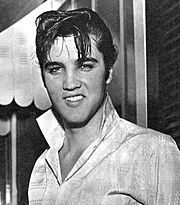
After Wanda toured with Elvis Presley, their relationship became romantic in 1955. He asked her to make their relationship official by giving Wanda a small diamond ring that she wore on a necklace. In her book, she said that Elvis "won my heart as I was just beginning to understand what it really meant to embrace my femininity and express myself as a young woman." According to Wanda, their relationship ended in 1956 once Elvis started appearing in movies and Colonel Tom Parker took control of his career.
In her teenage years, Wanda became friends with aspiring country performer Norma Jean. They often appeared on the Ozark Jubilee TV show and spent time together. Norma Jean started dating a local man named Wendell Goodman. Wanda sometimes joined them on dates. In 1961, Norma Jean accepted an offer to join The Porter Wagoner Show in Nashville and ended her relationship with Goodman. Wanda and Goodman started dating shortly after. In her 2017 book, she remembered falling in love with him before they started dating: "When they [Norma Jean and Goodman] had first come into the house and I saw Wendell, that was it. It was love at first sight." The couple married in 1961. Goodman had started a career in computers with IBM. But he left that job to become his wife's full-time business manager. He later managed his wife's company, Wanda Jackson Enterprises. In 2017, Goodman passed away at the age of 81.
The couple had two children. Their daughter, Gina, was born in 1962. Their son, Greg, was born in 1964. Because Wanda's husband traveled with her, their children stayed home and were raised by nannies. Wanda's parents also took care of the children on weekends. Wanda said in 2017, "I knew it wasn't a normal childhood for them, and I've always carried a little guilt about that."
Faith and Health
By 1971, Wanda felt unhappy in her work and personal life. She later explained, "I had everything that a person could need or want. But I still couldn't shake that dull but persistent sense of emptiness inside." After returning from a show, Wanda remembered going to church with her family and having a life-changing experience. She said in her book, "After we got up off our knees, everything was different." The couple found comfort in Christianity and dedicated their lives to their faith in 1971. They were later baptized. The couple said that faith saved their marriage.
In the 2010s, Wanda had pneumonia and was in the hospital for a week. She also had a stroke in 2018, which led her to retire. She said it would have affected her more if her daughter had taken her to the hospital later. She told The Independent in 2021, "I was so fortunate."
Discography
- Studio albums
- Wanda Jackson (1958)
- Rockin' with Wanda (1960)
- There's a Party Goin' On (1961)
- Right or Wrong (1961)
- Wonderful Wanda (1962)
- Love Me Forever (1963)
- Two Sides of Wanda (1964)
- Blues in My Heart (1965)
- Wanda Jackson Sings Country Songs (1965)
- Wanda Jackson Salutes the Country Music Hall of Fame (1966)
- Reckless Love Affair (1967)
- You'll Always Have My Love (1967)
- Cream of the Crop (1968)
- The Many Moods of Wanda Jackson (1968)
- The Happy Side of Wanda (1969)
- Wanda Jackson Country! (1970)
- A Woman Lives for Love (1970)
- I've Gotta Sing (1971)
- Praise the Lord (1972)
- I Wouldn't Want You Any Other Way (1972)
- Country Gospel (1973)
- Country Keepsakes (1973)
- When It's Time to Fall in Love Again (1974)
- Now I Have Everything (1975)
- Make Me Like a Child Again (1976)
- Closer to Jesus (1977)
- Good Times (1980)
- Show Me the Way to Calvary (1981)
- Let's Have a Party (1982)
- My Kind of Gospel (1983)
- Rockabilly Fever (1984)
- Teach Me to Love (1984)
- Let's Have a Party in Prague (with Karel Zich) (1987)
- Classy Country (1988)
- Encore (1988)
- Don't Worry Be Happy (1989)
- Goin' on with My Jesus (1991)
- Rock & Roll-ra Hívlak! (with Dolly Roll) (1992)
- Generations (Of Gospel Music) (1993)
- Let's Have a Party (1995)
- The Queen of Rock' a 'Billy (1997)
- Heart Trouble (2003)
- I Remember Elvis (2006)
- The Party Ain't Over (2011)
- Unfinished Business (2012)
- Encore (2021)
Filmography
| Title | Year | Role | Notes | Ref. |
|---|---|---|---|---|
| Music Village | 1965–1967 | Host | ||
| Welcome to the Club: The Women of Rockabilly | 2002 | Herself | ||
| The Sweet Lady with the Nasty Voice | 2008 | Herself | ||
| VH1 Divas Celebrates Soul | 2011 | Herself | Headline performer | |
| Country Music | 2019 | Herself |
Books
- Every Night Is Saturday: A Country Girl's Journey to the Rock & Roll Hall of Fame (with Scott Bomar) (2017)
Images for kids
See also
 In Spanish: Wanda Jackson para niños
In Spanish: Wanda Jackson para niños


